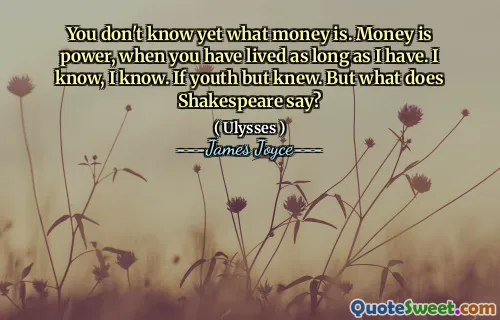You behold in me, Stephen said with grim displeasure, a horrible example of free thought.
In "Ulysses" by James Joyce, the character Stephen expresses his frustration with the concept of free thought. He perceives himself as a negative representation of this idea, suggesting that his free-thinking tendencies have led to dissatisfaction and disillusionment. This statement reflects his inner turmoil and the challenges he faces in navigating his identity and beliefs. Stephen's declaration can be interpreted as a critique of the struggles associated with intellectual freedom. It highlights the conflict between individual thought and societal expectations, revealing how embracing free thought can lead to feelings of alienation. Ultimately, Stephen's grim acknowledgment emphasizes the complexities of creativity and the burdens that can accompany it.
In "Ulysses" by James Joyce, the character Stephen expresses his frustration with the concept of free thought. He perceives himself as a negative representation of this idea, suggesting that his free-thinking tendencies have led to dissatisfaction and disillusionment. This statement reflects his inner turmoil and the challenges he faces in navigating his identity and beliefs.
Stephen's declaration can be interpreted as a critique of the struggles associated with intellectual freedom. It highlights the conflict between individual thought and societal expectations, revealing how embracing free thought can lead to feelings of alienation. Ultimately, Stephen's grim acknowledgment emphasizes the complexities of creativity and the burdens that can accompany it.






